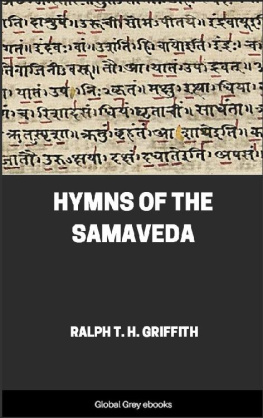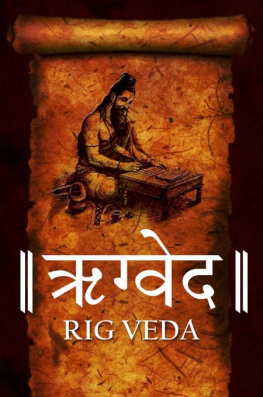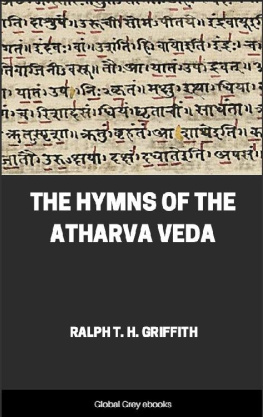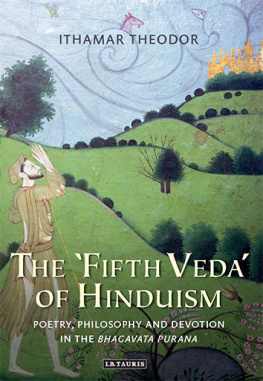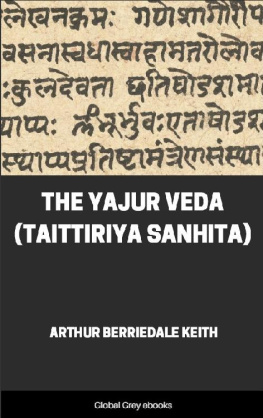Ralph T. H. Griffith - Hymns of the Samaveda
Here you can read online Ralph T. H. Griffith - Hymns of the Samaveda full text of the book (entire story) in english for free. Download pdf and epub, get meaning, cover and reviews about this ebook. year: 2019, publisher: Global Grey ebooks, genre: Religion. Description of the work, (preface) as well as reviews are available. Best literature library LitArk.com created for fans of good reading and offers a wide selection of genres:
Romance novel
Science fiction
Adventure
Detective
Science
History
Home and family
Prose
Art
Politics
Computer
Non-fiction
Religion
Business
Children
Humor
Choose a favorite category and find really read worthwhile books. Enjoy immersion in the world of imagination, feel the emotions of the characters or learn something new for yourself, make an fascinating discovery.
- Book:Hymns of the Samaveda
- Author:
- Publisher:Global Grey ebooks
- Genre:
- Year:2019
- Rating:3 / 5
- Favourites:Add to favourites
- Your mark:
- 60
- 1
- 2
- 3
- 4
- 5
Hymns of the Samaveda: summary, description and annotation
We offer to read an annotation, description, summary or preface (depends on what the author of the book "Hymns of the Samaveda" wrote himself). If you haven't found the necessary information about the book — write in the comments, we will try to find it.
Hymns of the Samaveda — read online for free the complete book (whole text) full work
Below is the text of the book, divided by pages. System saving the place of the last page read, allows you to conveniently read the book "Hymns of the Samaveda" online for free, without having to search again every time where you left off. Put a bookmark, and you can go to the page where you finished reading at any time.
Font size:
Interval:
Bookmark:
HYMNS OF THE SAMAVEDA
TRANSLATED WITH A POPULAR COMMENTARY
BY
RALPH T.H. GRIFFITH
1895
Hymns of the Samaveda By Ralph T. H. Griffith.
This edition was created and published by Global Grey
GlobalGrey 2019

globalgreyebooks.com
The Samaveda, or Veda of Holy Songs, third in the usual order of enumeration of the three Vedas, ranks next in sanctity and liturgical importance to the Rgveda or Veda of Recited praise. Its Sanhita, or metrical portion, consists chiefly of hymns to be chanted by the Udgatar priests at the performance of those important sacrifices in which the juice of the Soma plant, clarified and mixed with milk and other ingredients, was offered in libation to various deities. The Collection is made up of hymns, portions of hymns, and detached verses, taken mainly from the Rgveda, transposed and re-arranged, without reference to their original order, to suit the religious ceremonies in which they were to be employed. In these compiled hymns there are frequent variations, of more or less importance, from the text of the Rgveda as we now possess it which variations, although in some cases they are apparently explanatory, seem in others to be older and more original than the readings of the Rgveda. In singing, the verses are still further altered by prolongation, repetition and insertion of syllables, and various modulations, rests, and other modifications prescribed, for the guidance of the officiating priests, in the Ganas or Song-books. Two of these manuals, the Gramageyagdna, or Congregational, and the Aranyagana or Forest Song-Book, follow the order of the verses of part I, of the Sanhita, and two others, the Uhagana, the Uhyagana, of Part II. This part is less disjointed than part I, and is generally arranged in triplets whose first verse is often the repetition of a verse that has occurred in part I.
There is no clue to the date of the compilation of the Samaveda Hymns, nor has the compiler's name been handed down to us. Such a manual was unnecessary in the early times when the Aryans first came into India, but was required for guidance and use in the complicated ritual elaborated by the invaders after their expansion and settlement in their new homes.
There are three recensions of the text of the Samaveda Sanhita, the Kauthuma Sakha or recension is current in Guzerat, the Jaiminiya in the Carnatic, and the Ranayaniya in the Mahratta country. A translation, by Dr. Stevenson, of the Ranayaniya recension-or, rather, a free version of Sayana's paraphrase-was edited by Professor Wilson, in 1842; in 1848 Professor Benfey of Gttingen brought out an excellent edition of the same text with a metrical translation, a complete glossary, and explanatory notes; and in 1874-78 Pandit Satyavrata Samasrami of Calcutta published in the Bibliotheca Indicaa. most meritorious edition of the Sanhita according to the same recension, with Sayana's commentary, portions of the Song-books, andi other illustrative matter. I have followed Benfey's text, and have, made much use of his glossary and notes. Pandit Satyavrata Samasrami's edition also has been of the greatest service to me. To Mr. Venis, Principal of the Benares Sanskrit College, I am indebted for, the loan of the College manuscripts of the text and commentary.
I repeat the expression of my obligations to those scholars whose works assisted me in my translation of the Hymns of the Rgveda. For help in translating the non-Rgvedic Hymns of the Samaveda, I am additionally indebted to the late Professor Benfey and to Professor Ludwig whose version will be found in his Der Rgveda, vol. III, pp. 19-25.
For further information regarding the Samaveda Weber's History Of Indian Literature, and Max Mller's History of Ancient Sanskrit Literature, or the article on the Veda in Chamber's Encyclopaedia should be consulted.
R.T.H. GRIFFITH
Kotagiri, Nilgiri
25th May,1893.
Om. Glory to the Samaveda! To Lord Ganesa glory! Om.
DECADE I Agni
1. Come, Agni, praised with song, to feast and sacrificial offering: sit
As Hotar on the holy grass!
2. O Agni, thou hast been ordained Hotar of every sacrifice,
By Gods, among the race of men.
3. Agni we choose as envoy, skilled performer of this holy rite,
Hotar, possessor of all wealth.
4. Served with oblation, kindled, bright, through love of song may Agni, bent
On riches, smite the Vritras dead!
5. I laud your most beloved guest like a dear friend, O Agni, him
Who, like a chariot, wins us wealth.
6. Do thou, O Agni, with great might guard us from all malignity,
Yea, from the hate of mortal man!
7. O Agni, come; far other songs of praise will I sing forth to thee.
Wax mighty with these Soma-drops!
8. May Vatsa draw thy mind away even from thy loftiest dwelling place!
Agni, I yearn for thee with song.
9. Agni, Atharvan brought thee forth by rubbing from the sky, the head
Of all who offer sacrifice.
10. O Agni, bring us radiant light to be our mighty succour, for
Thou art our visible deity!
DECADE II Agni
1. O Agni, God, the people sing reverent praise to thee for strength:
With terrors trouble thou the foe
2. I seek with song your messenger, oblation-bearer, lord of wealth,
Immortal, best at sacrifice.
3. Still turning to their aim in thee the sacrificer's sister hymns
Have come to thee before the wind.
4. To thee, illuminer of night, O Agni, day by day with prayer,
Bringing thee reverence, we come.
5. Help, thou who knowest lauds, this work, a lovely hymn in Rudra's praise,
Adorable in every house!
6. To this fair sacrifice to drink the milky draught art thou called forth:
O Agni, with the Maruts come!
7. With homage will I reverence thee, Agni, like a long-tailed steed,
Imperial lord of holy rites.
8. As Aurva and as Bhrigu called, as Apnavana called, I call
The radiant Agni robed with sea.
9. When he enkindles Agni, man should with his heart attend the song:
I kindle Agni till he glows.
10. Then, verily, they see the light refulgent of primeval seed,
Kindled on yonder side of heaven.
DECADE III Agni
1. Hither, for powerful kinship, I call Agni, him who prospers you,
Most frequent at our solemn rites.
2. May Agni with his pointed blaze cast down each fierce devouring fiend:
May Agni win us wealth by war!
3. Agni, be gracious; thou art great: thou hast approached the pious man,
Hast come to sit on sacred grass.
4. Agni, preserve us,from distress consume our enemies, O God,
Eternal, with thy hottest flames
5. Harness, O Agni, O thou God, thy steeds which are most excellent!
The fleet ones bring thee rapidly.
6. Lord of the tribes, whom all must seek, we worshipped Agni set thee down,
Refulgent, rich in valiant men.
7. Agni is head and height of heaven, the master of the earth is he
He quickeneth the waters' seed.
8. O Agni, graciously announce this our good fortune of the Gods,
And this our newest hymn of praise!
9, By song, O Agni, Angiras! Gopavana hath brought thee forth
Hear thou my call, refulgent one!
10. Agni, the Sage, the Lord of Strength, hath moved around the sacred gifts,
Giving the offerer precious things.
11. His heralds bear him up aloft, the God who knoweth all that lives,
The Sun, that all may look on him.
12, Praise Agni in the sacrifice, the Sage whose holy laws are true
The God who driveth grief away.
13. Kind be the Goddesses to lend us help, and kind that we may drink:
Font size:
Interval:
Bookmark:
Similar books «Hymns of the Samaveda»
Look at similar books to Hymns of the Samaveda. We have selected literature similar in name and meaning in the hope of providing readers with more options to find new, interesting, not yet read works.
Discussion, reviews of the book Hymns of the Samaveda and just readers' own opinions. Leave your comments, write what you think about the work, its meaning or the main characters. Specify what exactly you liked and what you didn't like, and why you think so.

